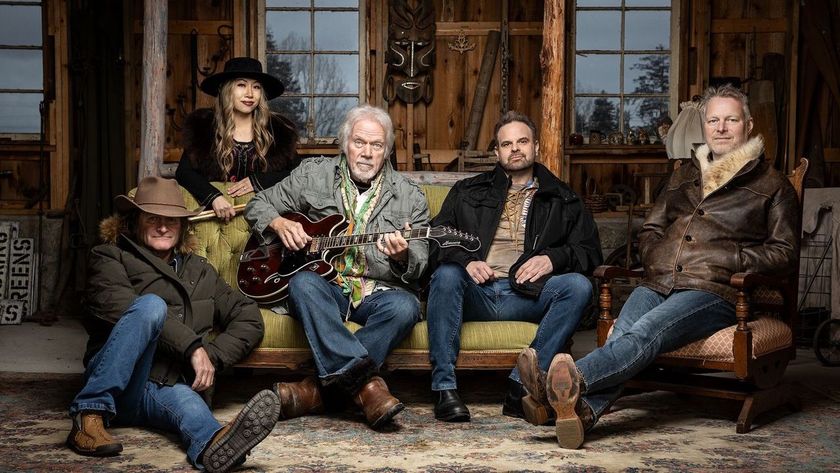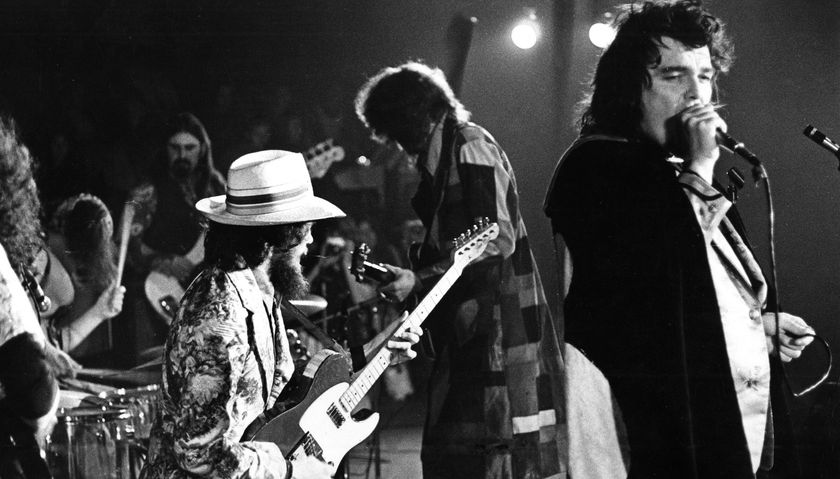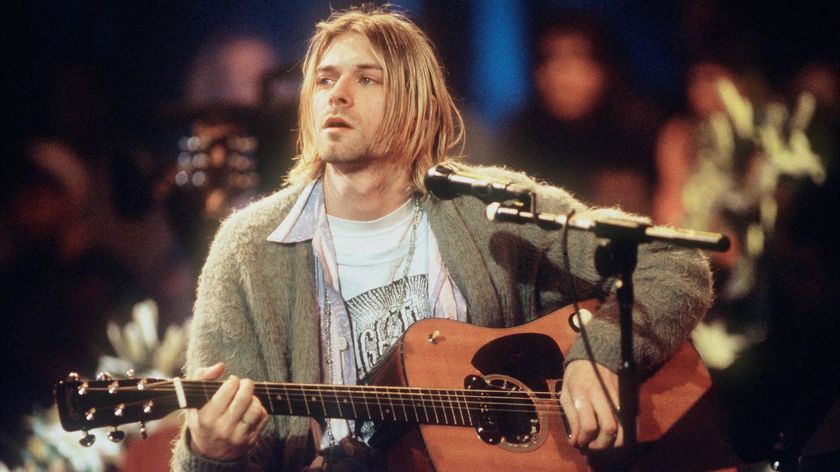Thirty Veteran Guitarists — Including Slash, Steve Vai and John Petrucci — Pick the Song They'd Most Want to Be Remembered By, Part 2

From the GW Archive: This feature originally appeared in the May 2002 issue of Guitar World. The story has a "time capsule" theme: We asked several veteran guitarists to choose the one song they'd most want to be remembered by after many years. Here we are, 13 years later (Does that qualify as "many"?), opening the time capsule to examine its contents! Enjoy!
A few decades ago, NASA sent a probe called Voyager straight out of the solar system. Its mission: to make contact with alien intelligence.
The capsule was crammed with artifacts—including greetings in more than 50 languages—intended to convey information about Earth's cultures. But just in case those items failed to communicate across language barriers, NASA also included a recording of Chuck Berry performing his rock and roll masterpiece "Johnny B. Goode."
For a while after Voyager's launch, the joke around the agency was that a reply had been received from an alien civilization: "Forget the scientific shit," went the message. "Send more rock and roll!" But what songs should be sent? We at Guitar World decided the logical place to start would be the musicians themselves.
In a project that started almost five years ago (hence the inclusion of George Harrison in Part 1), we began asking many of the most influential guitarists in rock, blues and metal one deceptively simple question: "If you had to put one of your songs in a time capsule to be opened sometime in the future, which would you choose, and why?"
Check out Part 2 of the story below.
Part 1, featuring Eddie Van Halen, Jeff Beck, George Harrison, Dimebag Darrell, Joe Satriani, Kirk Hammett, John Paul Jones and more, is available here.
Dave Mustaine (Megadeth),
"Holy Wars...The Punishment Due"
Rust in Peace (1990)
“Because we will never cease trying to dominate one another.”
Steve Vai,
"Love Secrets"
Passion and Warfare (1990)
"If it's going to be aliens that will discover this piece of music thousands of years from now, I'd pick 'Love Secrets.' The song is an unbridled ride though my imagination. It was void of any contemporary parameters when I wrote it, because the approach I took to composing it was rather unorthodox.
"The harmonic structure is very rich; it's a thought-out piece of music, and it's not just a bunch of noise. Somehow, it's very arranged but it's still completely chaotic.
"I had a profound dream experience when I was 15 or 16, and the song is the audio reality of that very bizarre and lucid dream stat. After researching this phenomenon, I realized that I was not alone in experiencing incredibly dynamic, rich music in a dream. It was like witnessing a thousand-piece orchestra.
"The experience was very intense-it wasn't like I was listening to it with my ears; I was hearing the music with 'inner ears.' The music was raging, and I can't even express what I was experiencing visually.
"I tried to reproduce this music, and even though my attempt was a complete failure at best, I still think it's one of the best pieces of music I've ever written. I really think it represents the pinnacle of my ability to combine my spiritual quest in life with my absurd technical inclinations."
Slash (Guns N' Roses),
"Paradise City"
Appetite for Destruction (1987)
"This is the song that's most indicative of what I'm really into as a musician. One of the things I enjoy about being a guitar player is striving to reach some kind of a goal, even when I'm not sure what that is.
And 'Paradise City' was the closest I got to doing what I would consider great, loud, fuckin' riff rock that clocks in at just three minutes. That's where I was headed, and that was the closest I got to realizing my goal in terms of expressing myself on the guitar in GN'R."
Buddy Guy,
"Damn Right, I've Got the Blues"
Damn Right, I've Got the Blues (1991)
I am especially proud of the lyrics and I really feel them every time I sing this song. If you don’t understand what it’s about, just keep living and you’re going to find out. People think money will make them happy, but if you’re rich you got to worry about keeping it and if you’re poor you got to worry about getting it. That’s why ‘Damn Right, I’ve Got the Blues’ is a story that speaks to everyone.
“It’s like my pal Bo Diddley said: ‘Even Donald Trump’s got the blues,’ because he has to keep all those women away from his money. Or take Bill Gates: the guy invents ways to make money and every month they try to take him to court for something else.
"Someone’s always after him, and that is what they call the blues. It comes to you in all forms and fashions. When I was a kid plowing with a mule, I thought that if I just had $5,000 I’d never have to plow again. I didn’t know you can’t ever get away from it. Damn right.”
Zakk Wylde (Ozzy Osbourne),
"No More Tears"
No More Tears (1991)
"People seem to like this little ditty. Why? It's a cool tune; I guess the solo's alright, and the guitar tone sounds pretty cool. People ask how I got that low, growling sound at the end of the verses.
"It was just a 50-watt amp and a Les Paul with EMG pickups. And I went straight in, didn't run it through anything. When they mixed it, I think they put some SPX90 effect on it. It was in drop-D tuning, and we were at the A=440 pitch. It wasn't like I dropped down to some really low tuning."
John Petrucci (Dream Theater),
"Six Degrees of Inner Turbulence"
Six Degrees of Inner Turbulence (2002)
"I'm very lucky because i can get away with choosing an entire CD—this 42-minute composition is the title song of our new album.
"It's an easy choice because it is the best possible representation of both my playing and the band's sound, running the gamut of every facet of our music. And because I co-wrote and co-produced it, I am, of course, particularly attached to it."
Jerry Cantrell (Alice In Chains),
"Rain When I Die"
Dirt (1992)
"This is a song that makes me feel kind of 'purged' when I play it. I think a lot of our material is like a trip trough a dark place and out the other side.
"This is a song about a relationship between a man and a woman.You have that rolling, really dark, heavy snaky riff, and the lyrical content is dark. Yet it's very uplifting in the chorus. For me, the chorus is the resolution, coming out of the darkness."
Gary Rossington (Lynyrd Skynyrd),
"Simple Man"
Pronounced 'Lĕh-'nérd 'Skin-'nérd (1973)
“ ‘Simple Man’ says a lot, philosophically. I really think I am a simple man, and that’s the best way to be. Just be yourself and believe in God and find a good woman and don’t worry about getting rich and all that.
"That’ll come along with the simple things. I went through the drugs and alcohol and that crap, and I quit it all. I wish it hadn’t taken so long, because it ruins a lot of stuff. It’s a dead-end road, and once you get to the end, you gotta turn around and go all the way back.
"But when it’s all over, it’s great and you really do get grounded and realize it’s about making music—so enjoy the process.”
Kerry King (Slayer),
"Payback"
God Hates Us All (2001)
“On this record I tried to write more directly about feelings that people have every day, so they don’t have to wonder what I’m talking about and how it relates to them. I think fans are going to hear a song like ‘Payback’ and say, ‘Man, that was me the other day!’
"‘Payback’ was written because everybody at some point in their lives has been wronged, pissed off or cut down by somebody—it’s a feeling everybody knows.
"I wanted to pick some dark subjects that would be appropriate on a Slayer record and make them more personal and see if this stuff means more to the fans than some of the stuff on our earlier records.”
Dickey Betts (The Allman Brothers Band),
"In Memory of Elizabeth Reed"
Idlewild South (1970)
“It’s an awfully strong piece of music in that it allows all of the other players to have something they can really participate in.
"It offers a lot of room for players to express themselves, and all of the musicians that have played in the Allman Brothers over the years have loved to play that song. It’s true for me too; we all really enjoy the improvisation that the song allows.”
Andy Summers (The Police),
"Message In A Bottle"
Regggatta De Blanc (1979)
“I think, as a pop song, ‘Message’ has perfect form, with just enough alternation between tension and release to maintain the listener’s interest. Plus, the strong forward motion of the guitar riff maintains excitement all the way through the song.
"The lyrics are among Sting’s best—the graphic image of a man alone on an island, the message in a bottle as a metaphor for loneliness, and the surreal image of a hundred billion bottles washed up on the shore to indicate how much loneliness is out there. It also has what I consider Stewart [Copeland]’s finest drum track.
"When we recorded it, we learned how to keep the energy of the music up by doing a take and keeping the tape going while we rolled right into another take. For a while we opened our shows with ‘Message,’ and it always made us feel great and totally blew the audience away. To me, the sound of this song is the Police.”
Peter Frampton,
"Do You Feel Like We Do"
Frampton Comes Alive (1976)
“It started as a song about a hangover. I woke up with a wineglass by the bed and then went to rehearsal with a hangover.
"I started playing these chords I’d come up with on the acoustic the night before—D-F-C-G-D—which became the chorus. I added this riff we’d been jamming on in rehearsal, and it all came together. The guys in the band said, ‘C’mon, Pete, write some words—it’s almost there.’
"I said I couldn’t, that I had this really bad hangover. They said, ‘Well, sing about that.’ So I started with, ‘Woke up this morning with a wineglass in my hand.’ Nowadays that’s as far as I get before the audience takes over and sings the whole thing.
"When I emphasize the second ‘you’ in the chorus, ‘Do you—you…’ everybody’s arm is in the air, pointing. I didn’t know it when I wrote it, but when I start involving the audience, then the personal suddenly becomes universal. And then it’s not my song anymore—it’s everybody’s.”
Scott Ian (Anthrax),
"Only"
Sound of White Noise (1983)
“Because [Metallica’s] James Hetfield told me it was a perfect song.”
Kenny Wayne Shepherd,
"While We Cry"
Ledbetter Heights (1995)
“I was going to say ‘Blue on Black,’ but I went with this one instead, partly because it’s an instrumental. Years from now words, language, may be totally different, but people will still be able to understand the emotion in an instrumental like ‘Why We Cry.’
"I mean, we still feel what Mozart and Bach’s music was about 300 years later.
"When the guitar is the only voice in an instrumental or a solo, I can get into a state where the music just flows out of me. And when it’s time to wind down, it almost takes me down with it.”
Jimmie Vaughan,
"Planet Bongo"
Do You Get The Blues? (2001)
“ ‘Planet Bongo’ sums up everything that’s influenced me in music in a single song.
"It’s me looking at exactly where I’m from through a pair of blues-tinted sunglasses. It’s all American; you could pick the song apart and find blues, jazz and gospel elements but nothing that’s not uniquely of this country. It’s not going to change the world, but it will help make it a little bit of a more fun place to be.”
Johnny Winter,
"Be Careful With a Fool"
Johnny Winter (1969)
“I don’t really know why I’d pick this song, but I think it has a lot of soul and a lot of that good blues feeling. I also think it represents my sound and my style of guitar playing well. I learned it from B.B. King’s original version, which I love.”
Stone Gossard (Pearl Jam),
"Nothingman"
Vitalogy (1994)
"The way this song came together, the way it sounds, the simplicity of it and the intention behind how it came about are all connected. It was a period of time when everybody in the band was a little frustrated.
"All of us had been writing, and I knew Jeff [Ament, Bass] was in the studio with this song he had been working on.
"So I dropped by to see if I could add some stuff—and within 20 minutes we had that song worked out. With that song, everybody in the band really took some steps toward each other, and something beautiful came out of it."
Get The Pick Newsletter
All the latest guitar news, interviews, lessons, reviews, deals and more, direct to your inbox!
Since 1980, Guitar World has been the ultimate resource for guitarists. Whether you want to learn the techniques employed by your guitar heroes, read about their latest projects or simply need to know which guitar is the right one to buy, Guitar World is the place to look.

"The BTO sound is BACK!!" Bachman-Turner Overdrive release first new material in over 25 years – and it features a Neil Young guitar solo

“He would beat the crap out of the guitar. The result can best be described as Jackson Pollock trying to play like John Lee Hooker”: Aggressively bizarre, Captain Beefheart's Trout Mask Replica remains one of the craziest guitar-driven albums ever made

